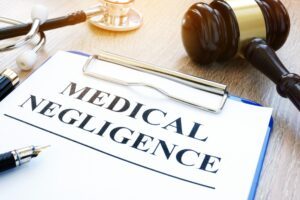The medical negligence claim process can appear daunting at first. That is why we have prepared this guide to break the process down and explain how one of our solicitors could support you if you have a valid claim.
First, we explain what medical negligence is and how medical professionals have a duty of care to their patients. You will also see information on how working with a trained legal representative for your claim will be of considerable benefit.
The main feature of this guide is our explanation of the Pre Action Protocol that needs to be followed for medical negligence claims. We have not only explained each of these steps but also highlighted how these are all things a solicitor could assist you with.
The final section of our guide is focused on the No Win No Fee contract our solicitors can offer potential claimants and how such a contract presents clear advantages to those who choose to work with us.
To talk to an advisor for further guidance or to get a free assessment of the validity of your potential medical negligence compensation claim, use the details provided below. Our team are available 24 hours a day to answer your questions, provide additional information, and offer a consultation concerning your eligibility for free.
- Call us on 0800 652 3087.
- Begin your claim online by completing this form.
- Click the live chat button at the bottom of your screen for a quick response to your queries.
Select A Section
- Can I Claim Medical Negligence Compensation?
- Do I Need A Solicitor To Claim For Medical Negligence?
- What Is The Medical Negligence Claim Process?
- How Our Solicitors Can Help With The Medical Negligence Claim Process
- Further Resources On Medical Negligence Claims
Can I Claim Medical Negligence Compensation?
Medical negligence, also referred to as clinical negligence, occurs when a trained medical professional (e.g. a nurse, surgeon, GP, pharmacist) causes a patient to experience avoidable harm by failing to provide the correct standard of medical care. The duty to provide the correct standard of medical care is owed by all healthcare professionals to their patients regardless of whether they work in public or private healthcare.
In order to claim medical negligence compensation, you will need to demonstrate with clear evidence that the medical professional you were receiving treatment from failed to meet the expected standard and caused you avoidable harm. Avoidable harm refers to harm that would not have been caused had the correct standard of care been met.
It is not sufficient to merely be dissatisfied with the level of care you received. You can complain to your healthcare provider regarding the treatment you received or the conduct of a medical professional, but if the correct standard of care has been provided, you cannot start a medical negligence claim.
To find out if you are eligible to begin the medical negligence claim process, contact our advisory team today using the contact information given above.
Time Limit To Start The Medical Negligence Claim Process
The majority of medical negligence claims are subject to a limitation period of 3 years, as established by the Limitation Act 1980. This is counted either from the date you receive the substandard care leading to avoidable harm or from what is referred to as the date of knowledge. This is the date you would have been reasonably expected to connect the avoidable harm you sustained with the incorrect care you received.
However, exceptions to this can be made in certain cases. For example, injured persons who were minors when they received the negligent medical treatment will have the 3-year limit paused until they turn 18. Injured persons who lack sufficient mental capacity to claim by themselves are not subject to any time limitation period.
In both cases, a litigation friend may be appointed to act on the injured person’s behalf and start the claim sooner. To learn about the medical negligence time limit, or to check if any exceptions apply to your potential claim, contact our advisors today.
Do I Need A Solicitor To Claim For Medical Negligence?
Legally speaking, no. It is not a requirement for a solicitor to represent medical negligence claims. However, working with a trained and experienced legal professional during the medical negligence claim process will definitely be to your benefit.
Just some of the things one of our highly experienced medical negligence solicitors could support you with are listed here:
- Communicating with the legal representatives of your healthcare provider.
- Assisting you with the collection of supporting evidence.
- Ensuring your claim is brought within the relevant time limit
- Calculating a compensation figure for your claim and negotiating a fair settlement.
A solicitor can also help you through the Pre Action Protocol. We’ll go through these in detail in the next section. To find out if a solicitor can help you through the medical negligence claims process, talk to our advisors today.
What Is The Medical Negligence Claim Process?
The medical negligence claim process follows the Pre-Action Protocol for the Resolution of Clinical Disputes. This Protocol sets out the steps that need to be followed during a given claim. We have set out the Protocol for your reference.
Obtaining Health Records
As part of your claim, you will need to provide sufficient proof of medical negligence. This is done by providing your medical records. You have to right to request copies of medical records showing treatment you have received. As well as showing the substandard treatment that caused the avoidable harm to begin with, you can also acquire medical evidence of any additional procedures needed to correct the avoidable harm. The copies of the records should be provided within 40 days of the request.
Rehabilitation
All parties need to consider whether the claimant has needs that can be met through rehabilitation or treatment. Discussions should also be had on how these needs can be addressed. This should be done as early as possible.
Letter of Notification
The letter notification will be sent from the claimant to the defendant to inform them that a claim is likely to be made against them. On receipt of this letter, the defendant should send an acknowledgement within 14 days and consider what investigations should be opened to establish the facts of the case.
Letter of Claim
The Letter of Claim sets out the grounds on which the claim will be made. It also acts as the formal declaration that a claim is being opened against the defendant. A letter of claim should contain a clear summary of harm the claimant has suffered, and the allegations of misconduct against the medical professional. It should refer to any relevant documents, such as health records. Details of any financial losses should also be included here.
Letter of Response
A Letter of Response should be sent from the defendant to the claimant within 14 days of the receipt of the Letter of Claim. The defendant should identify who will be dealing with the matter and their admission of misconduct, if any.
Experts
In clinical negligence disputes, independent expert opinions, such as from an independent medical professional, may be required to address whether a breach of duty has occurred and the nature and severity of the patient’s condition and prognosis. They may also be required to assist in valuing certain aspects of the claim.
Alternative Dispute Resolution
Alternative Dispute Resolution, or “ADR”, is a means of resolving a dispute without engaging in a costly and protracted court proceedings. Examples of ADR can include a negotiation, where the legal representatives of both parties meet to discuss terms of settlement. An arbitration could also be sought, where a third party decides the dispute.
Medical negligence cases where ADR fails to bring about a settlement that is agreeable to both parties will likely go to court.
Our expert medical negligence solicitors can help you with all these steps if you are eligible to begin a claim. You can speak to an advisor using the contact information given below.
How Our Solicitors Can Help With The Medical Negligence Claim Process
After the previous section, we understand if you’re unsure where to start regarding the medical negligence claim process. That’s where our dedicated team of friendly advisors come in. They can answer any questions you have about the steps discussed in this guide.
Additionally, our advisors can offer a free assessment of your eligibility to claim. If your potential claim is deemed valid, then one of our experienced medical negligence solicitors could take on your case.
The type of No Win No Fee contract offered by our solicitors is known as a Conditional Fee Agreement or “CFA”. When instructing a solicitor to represent you under a CFA, not only will you benefit from their experience and support during the Pre-Action Protocol, but you will also enjoy some significant protections.
A CFA means you will not have to pay the solicitor a fee for them to begin working on your claim or as the claim progresses, in the majority of cases. As “No Win No Fee” indicates, there will be no fees to pay should the claim fail.
Should, however, the solicitor win the case, you will receive a clinical negligence compensation payout. A percentage of this compensation will be taken by the solicitor as their success fee before the rest of the compensation is transferred to you. Since success fees are discussed and agreed upon before the claim gets underway and are subject to a legally binding cap per The Conditional Fee Agreements Order 2013, you know from the outset that you will keep the majority of any compensation award you receive.
Contact Us Today
To talk to an advisor for further guidance on clinical negligence claims, use the details provided below. Our team are available 24 hours a day to answer your questions, provide additional information and offer a free initial consultation concerning your eligibility for free.
- Call us on 0800 652 3087.
- Begin your claim online by completing this form.
- Click the live chat button at the bottom of your screen for a quick response to your queries.
Further Resources On Medical Negligence Claims
You can learn more about medical negligence claims by reading these guides:
- If the wrong medication was administered in a hospital or GP surgery, you could suffer serious harm. This guide will help you find out more about claiming compensation.
- Learn about the eligibility criteria to claim compensation following errors during knee replacement surgery and how medical negligence claims are valued.
- If negligent delayed treatment caused you to suffer avoidable harm, you may entitled to claim. Read our guide for more information.
We have also included these external resources for additional guidance:
- In addition to making a medical negligence claim, you could also make a complaint about a service or provider through the Care Quality Commission (CQC). The CQC is the independent regulator of healt and adult social care in England.
- Some cases of medical negligence are so serious they are deemed Never Events by the NHS. These are serious incidents that are entirely preventable by providing the correct standard of care.
- Doctors in the UK are regulated by the General Medical Council. You can learn about their work on their website.
We’d like to thank you for reading our guide on the medical negligence claim process. To find out if your potential claim is valid or to ask any questions that may have arisen while reading this guide, speak to our advisors today. The team is available 24/7 using the contact information provided above.



